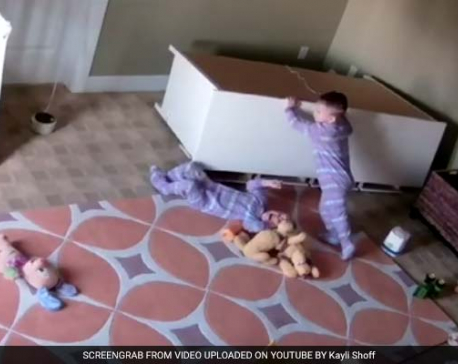
OR
Google's Duo app joins crowded field of video calling
Published On: August 17, 2016 11:40 AM NPT By: Associated Press

SAN FRANCISCO, Aug 17: Knock, knock, Google's video chatting app has arrived.
The app, dubbed Duo, represents Google's response to other popular video calling options, including Apple's FaceTime, Microsoft's Skype and Facebook's Messenger app.
Duo isn't much different from the other video chatting services, except that it gives a glimpse at who is making the call, helping the recipient decide whether to answer. Google calls this feature, "Knock, knock."
The new app, announced in May, is being released Tuesday as a free service for phones running on Google's Android operating system as well as Apple's iPhones.
Like FaceTime for iPhones, Duo only requires a person's phone number to connect. Many other services require both participants to have account logins to use their video calling options.
Google has been offering video calling through its Hangout feature for several years, but the internet company is now tailoring that service for business meetings.
Duo is being billed as a simpler, more reliable way to see friends and family as you talk to them.
It is the first of two new mobile apps that Google, owned by Alphabet Inc., has planned for this summer. The Mountain View, California, company also is preparing to unveil a new messaging app called Allo featuring a robotic assistant that will suggest automated responses to texts.
You May Like This

Music video 'Timro Mero Milan Ko Aayo Hera Holi Re' released (watch video)
KATHMANDU, March 8: A Nepali film ‘Butterfly’ has released a song on the occasion of Holi, a Hindu festival of... Read More...

2-year-old pushes fallen dresser off twin brother in video gone viral (with video)
OREM, UTAH, Jan 4: A 2-year-old boy in Utah has been caught on a nanny cam saving his twin brother by... Read More...

Poonam Pandey latest video takes social media by storm (with video)
MUMBAI, Dec 13: Model turned actress Poonam Pandey's recent video is grabbing eyeballs yet again. ... Read More...









Just In
- Forced Covid-19 cremations: is it too late for redemption?
- NRB to provide collateral-free loans to foreign employment seekers
- NEB to publish Grade 12 results next week
- Body handover begins; Relatives remain dissatisfied with insurance, compensation amount
- NC defers its plan to join Koshi govt
- NRB to review microfinance loan interest rate
- 134 dead in floods and landslides since onset of monsoon this year
- Mahakali Irrigation Project sees only 22 percent physical progress in 18 years









Leave A Comment